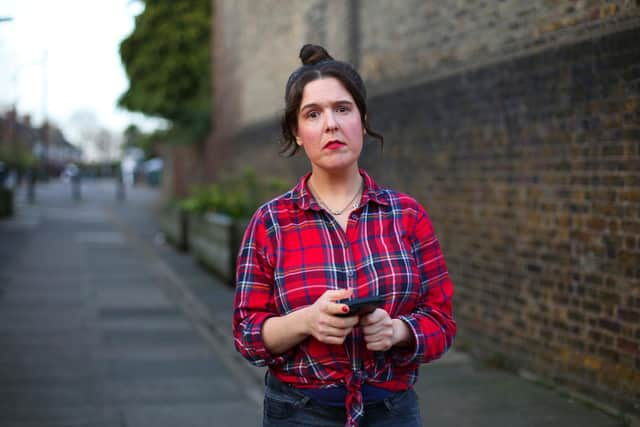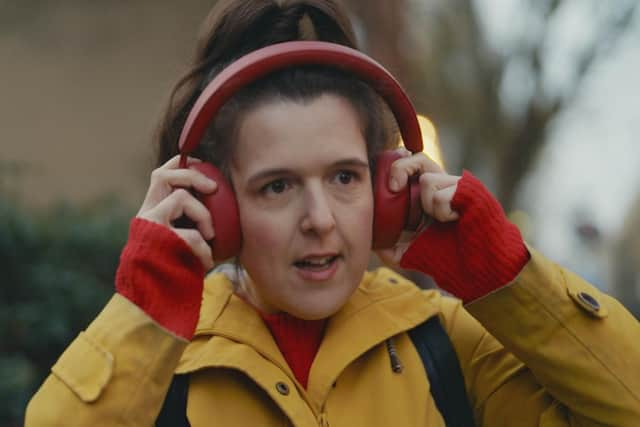Bridlington-born comedian Rosie Jones on her new Channel 4 documentary, ableist abuse and online trolling
While the abuse predates her fame, Jones’ appearances on the likes of 8 Out of 10 Cats, The Last Leg, and Question Time brought her, and her disability, into people’s homes, and soon the insults, taunts and slurs followed Jones home, too.
“I love my job, I love my career, I love my life, but of course, running alongside that, I am a woman with cerebral palsy,” says the 33-year-old comedian and writer from Bridlington.
Advertisement
Hide AdAdvertisement
Hide Ad“The bigger I’ve become in terms of my career, unfortunately the more abuse I have received online. And some of that is because I’m a woman, and of course women aren’t funny! But a lot of that abuse has definitely come from my disability.”


After dealing with ableism for years, Jones is fed up, angry and upset at how abuse directed towards disabled people doesn’t seem to be taken as seriously as racism, homophobia or other forms of hate speech, and wants to understand why people think it’s okay to troll others online.
Her new Channel 4 documentary sees her dive into the issue, from exploring why social media platforms allow hate speech to perpetuate, to speaking to families impacted by horrendous ableist abuse, and even to meeting a troll who has sent abusive messages online to find out why they did it.
The one-off documentary, titled Rosie Jones: Am I A R****d?, has already caused some friction due to the decision to use an ableist slur in the title.
Advertisement
Hide AdAdvertisement
Hide Ad“I need to say, first and foremost: it was my choice, my idea,” says Jones of the title, adding that she chose to use the slur because it is a word that has been “used as a weapon towards me all my life, and I really wanted to take control of it and say ‘this is not OK’.”


“I understand that some people may be offended, or will be very upset by it, but at the same time, it is unfortunately still a word that has been used every day towards me – and not only that, it is a word that is used casually in the pub by able-bodied people without even thinking,” she says.
“And I fundamentally believe that people don’t take ableist slurs as seriously as other slurs, so I decided to put it in the title so that hopefully people will still realise how offensive it is.
“And this might sound very rude, I do hope disabled people watch it, but if I’m honest, this documentary is not for disabled people, cause they already know all this s***. They don’t need to be reminded of the s*** we deal with every day.
Advertisement
Hide AdAdvertisement
Hide Ad“This is a film for non-disabled people who don’t know what ableism is … it is for non-disabled people who think it’s okay to sling that term and other equally abusive, ableist words in the pub willy-nilly. It is for them to see that it’s not OK.”


At one point, things got so bad that she considered giving up her comedy career, wondering whether the job was worth dealing with all of the hate speech and anger directed at her.
“Although I’ve received abuse and ableism before, it was on a very minute level, but once I started stand-up and I became bigger on TV and social media, I was exposing myself to a level of abuse that I didn’t expect,” says the comedian, who reveals that she now pays for an AI software that filters her tweets to allow her to enjoy engaging with her fans online.
“I remember the first time I did Question Time, my name started trending on Twitter, and it was because of the sheer level of abuse I was receiving.
Advertisement
Hide AdAdvertisement
Hide Ad“At that point (in) my career, I definitely thought: Is it worth it? Is it worth risking my own mental health?
“And my friends and family were a major part of that. I thought: Do I really want to be exposing them to this level of abuse? And is it even worth it when from my point of view at that time, it really felt like everyone hated me, everyone wanted me to be caged up, everyone didn’t think I were funny, everyone thought I was just on TV because I was ticking a box.”
Jones tried hard not to diffuse the tension created by the filming process by joking her way through it.
“The first few filming days were very interesting, because (director Tom Levinge) had to take me to one side and say to me: ‘You’re great, but can you stop being silly? Can you stop telling jokes? Can you stop trying to put everyone at ease?’ And I then realised that my way of helping, my way of dealing with doing such a serious documentary was doing what I normally do and cracking jokes left, right and centre.
Advertisement
Hide AdAdvertisement
Hide Ad“And then I had the realisation that I have done that all my life. All my life, when people feel awkward or uncomfortable around me, I break the tension immediately by cracking a joke, and it got to a point where I didn’t want to do it anymore because I think by breaking the tension I was almost giving them the knowledge that it was all OK. Like: ‘Don’t worry about me’.
“And the reality is: it’s not OK. It’s not okay that I receive ableism on a daily basis. It’s not OK that people think it’s OK to call me a r****d. So it took a long time for me to be comfortable peeling away that humour armour that I had been wearing for 33 years in order to protect myself.
“That was a journey, but I think by doing that, by being honest and truthful and vulnerable, we have created a documentary which hopefully will allow people to see what it’s like to be disabled in the UK in 2023.”
The documentary Rosie Jones: Am I A R****d? airs on Channel 4 at 10pm on Thursday, July 20.